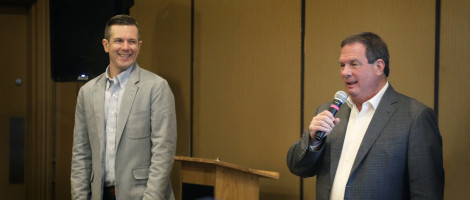Fostering, adopting and revitalizing churches
by Teresa Young on November 16, 2021 in Annual Meeting

Church consultants Thom and Sam Rainer believe that church adoptions will be outpacing church closures in the very near future, thanks to “the next great movement among American congregations.” In a Tuesday morning workshop at the 2021 Texas Baptists Annual Meeting in Galveston, the founders of ChurchAnswers explained the growing movement that is saving many struggling churches.
While the term replanting has been most widely used, Sam Rainer said he was drawn to the foster/adopt analogy more from his own experience both at home and in church life.
“I had a heart for struggling churches and those that need to be revitalized. When I started this work 15 years ago, we didn’t use that term. Thankfully, a lot more churches are receptive to that work,” said Sam.
Sam used the story of his own church, West Bradenton Baptist Church in Florida, as an illustration of the beauty of the foster/adoption process. He reached out to nearby Southside Baptist, which was down to 12 regular members and offered to help. The fostering congregation sent personnel for pastoral and worship assistance as well as facilities issues, and after a year, they decided to adopt the congregation to provide the best chance for growth.
Thom Rainer called adoption and fostering the countermovement to churches on the verge of closing due to a variety of challenges. He said the pandemic issues have sped up the inevitable changes and many churches are not ready to meet those.
He detailed the difference between revitalization efforts – an attempt to move a church to healthier status using internal resources – and that of adoption or fostering, which involves a healthier church working with them for a defined period of time. The relationship can start as solely fostering and move into adoption or stay at the foster level depending on how both congregations feel. For the Rainers, the key is transparency – going in with clear expectations for both churches – and posture.
Thom then explained some of the current trends in adoption of churches, such as the increase in number as churches have more awareness of alternatives to closure and leaders have a greater humility to reach out for help. He noted that adoption has also complemented the neighborhood church movement, where churches are reclaiming the neighborhoods around them.
“Your church address is not an accident. God has sovereignly placed you where you are. I firmly believe these churches are called to do work at these addresses until God returns,” added Sam. “We want to present hope that your address is a very important Kingdom outpost, so let’s figure out a way to save Kingdom work in these locations. I believe every church is worth saving.”

Jonathan Smith, Director of Church Health Strategy with the Baptist General Convention of Texas, added that Texas churches follow the nationwide pattern that 80-90 percent are in need of revitalization. His office works border to border to provide resources and consulting to help churches in that effort.
“It could mean the church is just missing one aspect, so we’re working to help the churches in their context. This is very contextual work,” noted Smith. “This is the autonomous work of the local church – often with the help of a coach or consultant – to get back to evangelism, discipleship and missions.”
Smith added that churches with less than 50 in regular attendance may be good candidates for a foster/adopt relationship. More than that may be able to engage in revitalization from within.
Most importantly, noted Thom, is the aspect of relationships within this foster/adopt effort. He encouraged more healthy churches to build relationships with other congregations and let those happen organically.
“Be a source of encouragement and help. Communication is key to both churches; you cannot over-communicate. And get good legal help if adoption does take place, since this is a legal transaction,” he said. “But prayer is the most important activity.”
Overall, the Rainers say that adoption or fostering is a win-win solution since it keeps churches going and growing on both sides of the equation.
“When a church starts fostering, it becomes revitalized itself, because it begins to look outward,” said Thom. “Churches have moved inwardly but an outward focus is a supernatural effort. It causes the entire church to be healthier.”
Strengthening a multiplying movement of churches to live out the Great Commandment and Great Commission in Texas and beyond.
The ministry of Texas Baptists is made possible by giving through the Texas Baptists Cooperative Program, Mary Hill Davis Offering® for Texas Missions, Texas Baptists Worldwide and Texas Baptist Missions Foundation. Thank you for your faithful and generous support.
Subscribe to receive stories like this one directly to your inbox.
We are more together.
Read more articles in: Annual Meeting
More from Teresa Young
- Texas Baptists Indemnity Program offers additional options for church insurance coverage
- Pastor Strong program helps ministers maintain health on all levels
- Missions Dinner emphasizes church planting successes
- Elijah Brown urges Texas Baptists to follow the first church’s paths to further the gospel
- Churches encouraged to awaken their hearts for missions to see gospel growth